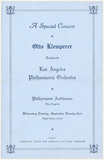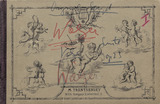Ernst Toch: Letter to Prince Hubertus zu Loewenstein (7 February 1939)
Ernst Toch: Letter to Prince Hubertus zu Loewenstein (7 February 1939)
Den andern Tag sagte ich zu Lilly: Honig, ich sagt, wenn ich weiter gehe gleich diesem, das ist wenn ich halte denkend englisch und sprechend deutsch, bin ich haftbar Nuesse zu gehen bevor lang, bin ich nicht? Du wettest dein Leben Du bist, sagte sie.
[The other day I said to Lilly: Honey, I said, if I keep going like this, that is, if I keep thinking English and speaking German, I'm liable to go nuts before long, am I not? You bet your life you are, she said. (ed. trans.)]
Ernst Toch, jokingly, to prince Hubertus to Loewenstein on 7 February 1939
After stints in Paris, London and New York, the composer Ernst Toch, who had gone into exile in 1933, and settled in Los Angeles in 1936. There he hoped to establish himself as a film composer. But professionally as well as personally, the acclimatisation process in California was rocky as the customs and rules of the game in the US film industry were foreign to him. Conventions such as doing business at private parties were anathema to him. Although the letter to Loewenstein, at its core, dealt with a completely different subject, Toch's intentionally incorrect use of German reflected the difficulty of feeling at home in a language. Figures of speech, in particular, are what allow a speaker to be understood in a foreign tongue and arrive intellectually in the language. Just as with the unwritten rules of society, mastery of the language could be decisive to success or failure in exile.
Toch's actual reason for writing to Loewenstein is his participation in the planned manuscript auction of the American Guild for German Cultural Freedom. As part of a letter auction, the Guild had asked Ernst Toch to send in a manuscript that could be auctioned off to support the aid organisation. In addition to Toch, other recipients also responded affirmatively, including Thomas Mann, Franz Werfel, Klaus Mann, Arnold Schönberg, Kurt Weill and Erich Wolfgang Korngold.





